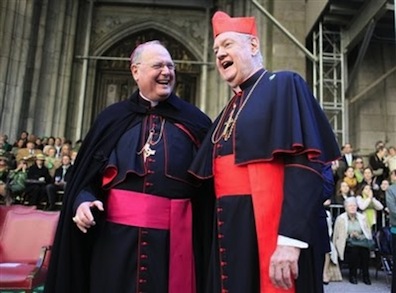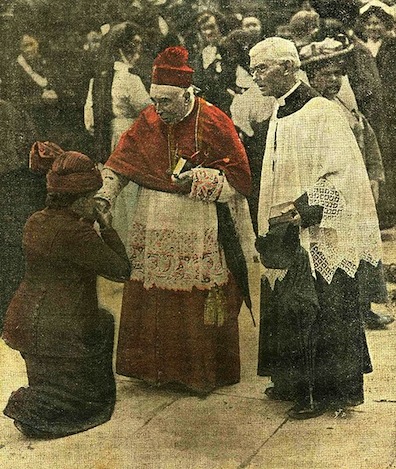In Proteus Stephen thinks of priests "moving burly
in their albs, tonsured and oiled and gelded, fat with the fat
of kidneys of wheat." The last phrase alludes to a passage in
the Bible, but its effect is to satirize the hypocrisy of
priests, eating well while they promote poverty among their
parishioners. The image of burly, fat, oily priests coheres
with a strain of anti-clericalism that runs through Joyce's
works.
In Deuteronomy, Moses sings of the blessings that God
bestowed on Jacob and his people Israel: "He made him ride on
the high places of the earth, that he might eat the increase
of the fields; and he made him to suck honey out of the rock,
and oil out of the flinty rock; Butter of kine, and milk of
sheep, with fat of lambs, and rams of the breed of Bashan, and
goats, with the fat of kidneys of wheat; and
thou didst drink the pure blood of the grape" (32:13-14).
Thornton credits Ulrich Schneider with having first spotted
the biblical allusion in Proteus.
In the Christmas dinner scene of A Portrait of the
Artist, Mr. Casey speaks scornfully of the "Princes of
the church," and Simon Dedalus chips in with a caricature of
Michael Logue, at the time the archbishop of Armagh and
Primate of All Ireland (he was made a cardinal in 1893): "—Tub
of guts, said Mr Dedalus coarsely. He has a handsome face,
mind you, in repose. You should see that fellow lapping up his
bacon and cabbage of a cold winter's day. O Johnny! / He
twisted his features into a grimace of heavy bestiality and
made a lapping noise with his lips."
Leopold Bloom has similar thoughts in Lestrygonians,
when he sees one of Dedalus' countless daughters: "Fifteen
children he had. Birth every year almost. That's in their
theology or the priest won't give the poor woman the
confession, the absolution. Increase
and multiply. Did you ever hear such an idea? Eat you
out of house and home. No families themselves to feed. Living
on the fat of the land. Their butteries and larders.
I'd like to see them do the black fast Yom Kippur. Crossbuns.
One meal and a collation for fear he'd collapse on the altar."
In Oxen of the Sun kidneys of wheat, with the aid
of yeast, make the mash that produces ale: "it was a marvel to
see in that castle how by magic they make a compost out of
fecund wheatkidneys out of Chaldee that
by aid of certain angry spirits that they do into it swells up
wondrously like to a vast mountain."

